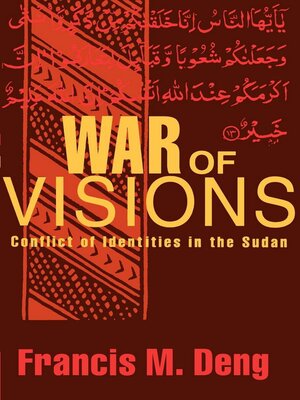
Sign up to save your library
With an OverDrive account, you can save your favorite libraries for at-a-glance information about availability. Find out more about OverDrive accounts.
Find this title in Libby, the library reading app by OverDrive.



Search for a digital library with this title
Title found at these libraries:
| Loading... |
The civil war that has intermittently raged in the Sudan since independence in 1956 is, according to Francis Deng, a conflict of contrasting and seemingly incompatible identities in the Northern and Southern parts of the country. Identity is seen as a function of how people identify themselves and are identified in racial, ethnic, cultural, linguistic, and religious terms. The identity question related to how such concepts determine or influence participation and distribution in the political, economic, social, and cultural life of the country.
War of Visions aims at shedding light on the anomalies of the identity conflict. The competing models in the Sudan are the Arab-Islamic mold of the North, representing two-thirds of the country in territory and population, and the remaining Southern third, which is indigenously African in race, ethnicity, culture, and religion, with an educated Christianized elite. But although the North is popularly defined as racially Arab, the people are a hybrid of Arab and African elements, with the African physical characteristics predominating in most tribal groups.
This configuration is the result of a historical process that stratified races, cultures, and religions, and fostered a "passing" into the Arab-Islamic mold that discriminated against the African race and cultures. The outcome of this process is a polarization that is based more on myth than on the realities of the situation. The identity crisis has been further complicated by the fact that Northerners want to fashion the country on the basis of their Arab- Islamic identity, while the South is decidedly resistant.
Francis Deng presents three alternative approaches to the identity crisis. First, he argues that by bringing to the surface the realities of the African elements of identity in the North— thereby revealing characteristics shared by all Sudanese—a new basis for the creation of a common identity could be established that fosters equitable






